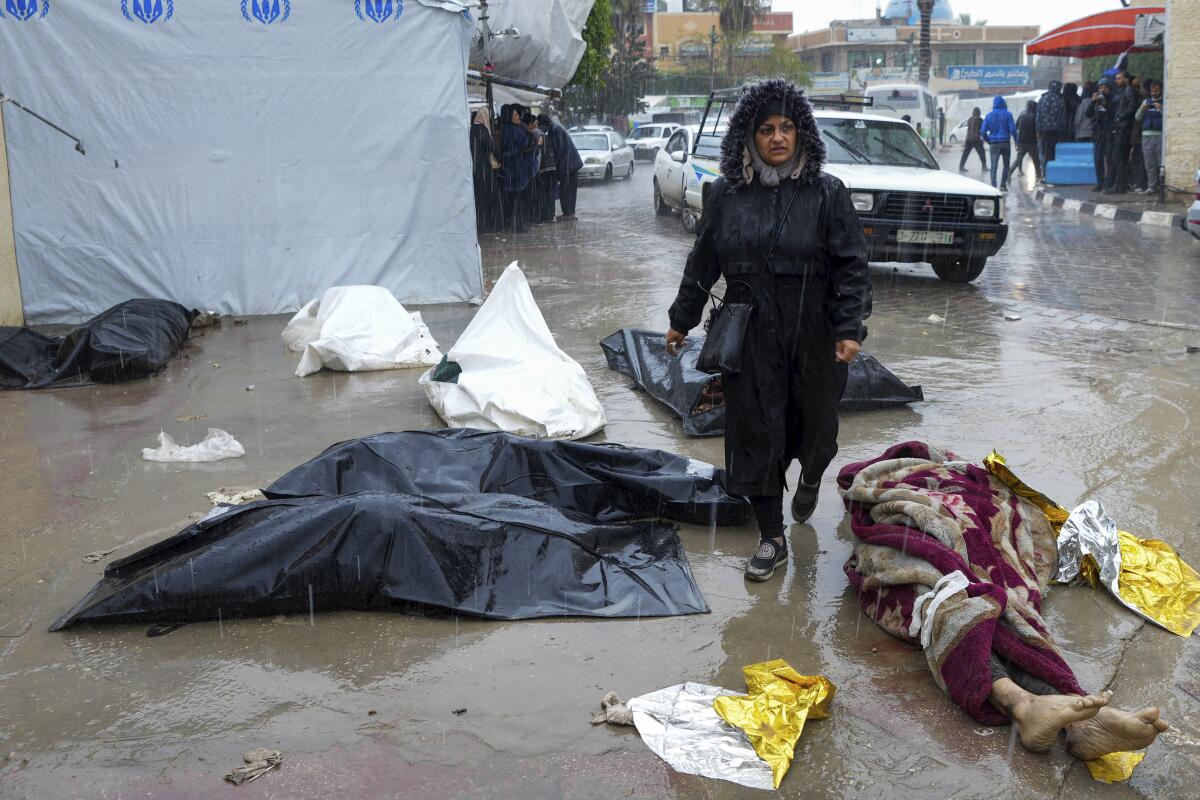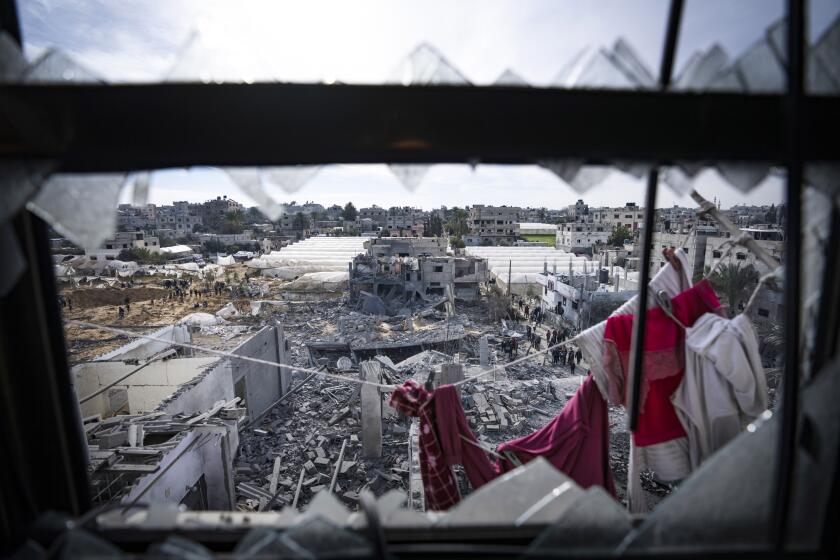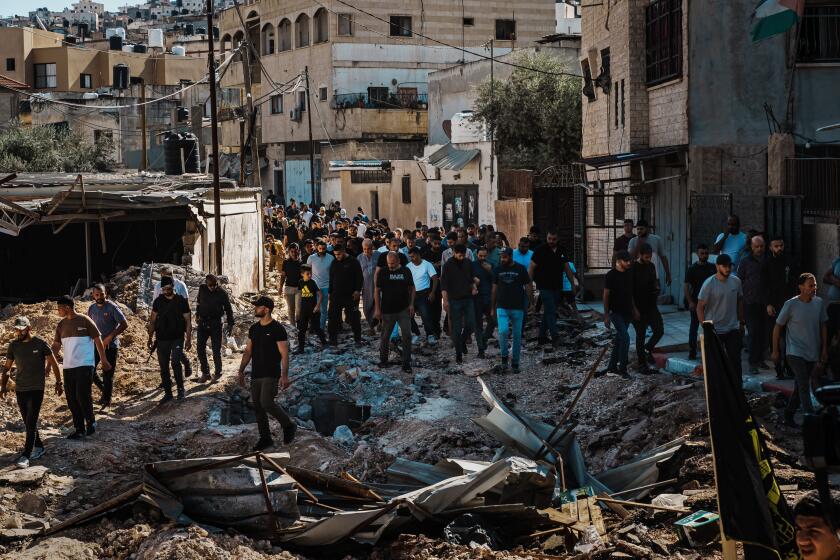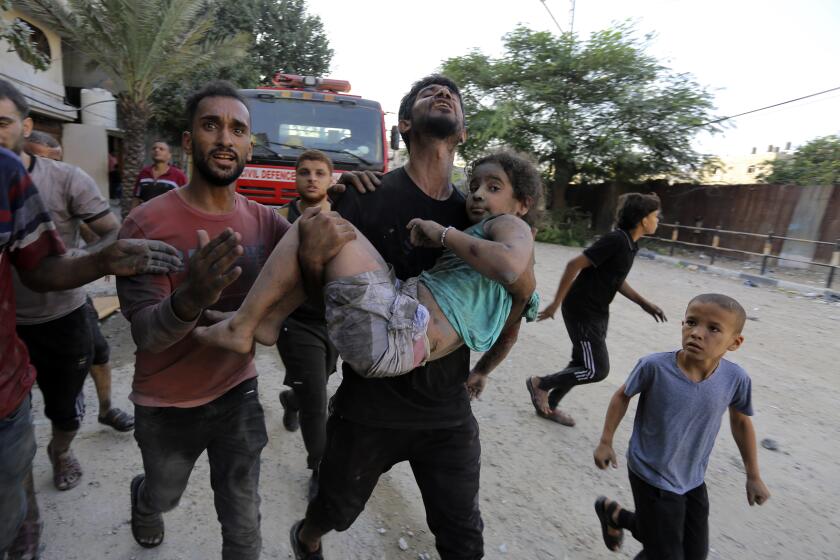Israel vows to ‘finish the job’ in Gaza as Cabinet member threatens Ramadan deadline for Rafah

- Share via
RAFAH, Gaza Strip — Israeli Prime Minister Benjamin Netanyahu on Sunday brushed off growing calls to halt the military offensive in Gaza, vowing to “finish the job” as a member of his wartime Cabinet threatened to invade its southernmost city if Hamas does not free remaining hostages by Ramadan.
“If by Ramadan our hostages are not home, the fighting will continue to the Rafah area,” retired general Benny Gantz told a conference of Jewish American leaders. The Muslim holy month of Ramadan, expected to begin March 10, is historically a tense time in the region.
Israel’s government has not publicly discussed a timeline for a ground offensive in Rafah, where more than half the Gaza Strip’s 2.3 million Palestinians have sought refuge. Gantz, part of Netanyahu’s three-member wartime Cabinet, represents an influential voice but not the final word on what might lie ahead.
The United States, meanwhile, says it will veto another draft United Nations resolution calling for a cease-fire.
The U.S., Israel’s top ally, instead hopes to broker a cease-fire agreement and hostage release between Israel and the Hamas militant group, and envisions a wider resolution of the Israeli-Palestinian conflict. Netanyahu has called Hamas’ demands “delusional” and rejected U.S. and international calls for a pathway to Palestinian statehood.
His Cabinet adopted a declaration Sunday saying Israel “categorically rejects international edicts on a permanent arrangement with the Palestinians.” It said Israel opposes any unilateral recognition of a Palestinian state, which it said would “grant a major prize to terror” after the Oct. 7 Hamas attack in southern Israel that triggered the latest war.
Gazans crammed into Rafah along the Egyptian border have no place to escape as Israeli attacks hit ever closer in a final bid to rescue remaining hostages.
Netanyahu has pushed back against international concern about a Rafah offensive, saying residents will be evacuated to safer areas. Where they will go in largely devastated Gaza is not clear.
The suggested timing for the offensive came as the World Health Organization chief said southern Gaza’s main medical center, Nasser Hospital, “is not functional anymore” after Israeli forces raided it in Khan Yunis last week.
Israeli strikes across Gaza killed at least 18 people overnight into Sunday, according to medics and witnesses.
An airstrike in Rafah overnight killed six people, including a woman and three children, and another strike killed five men in Khan Yunis, the main target of the offensive in southern Gaza in recent weeks. Associated Press journalists saw the bodies arrive at a hospital in Rafah.
“All those who were martyred were those whom the Jews asked to move to safe places,” said a bystander after the Rafah strike, Ahmad Abu Rezeq.
In Gaza City, which suffered widespread destruction in the initial weeks of the war, an airstrike flattened a home, killing seven people, including three women, according to Sayed al Afifi, a relative.
Israel’s military rarely comments on individual strikes and blames civilian casualties on Hamas because the militants operate in dense residential areas.
Palestinians in Jenin refugee camp, a center of West Bank resistance, say repeated Israeli raids appear intended to make their city as uninhabitable as Gaza.
Israeli military says it is looking for remains of hostages
World Health Organization Director-General Tedros Adhanom Ghebreyesus said a WHO team was not allowed to enter Nasser Hospital on Friday or Saturday to assess patients and critical medical needs. In a post on X, he said about 200 patients remain, including 20 who need urgent referrals elsewhere.
Israeli Minister of Defense Yoav Gallant said at least 200 militants surrendered at the hospital. He also said Hamas in Khan Yunis is defeated, and that the militant group is largely leaderless in Gaza. He gave no evidence to support the claims.
The military says it is looking for the remains of hostages inside the facility and does not target doctors or patients.
The Gaza Health Ministry said 70 medical personnel were among those arrested, along with patients in hospital beds. Ashraf al Qidra, a ministry spokesperson, said soldiers beat and stripped detainees. There was no immediate comment from the military on those allegations.
The Israeli military launched its war in response to a cross-border Hamas attack on Oct. 7 that killed about 1,200 people in Israel and took around 240 people hostage. Militants still hold about 130 hostages, a fourth of them believed to be dead. Most of the others were released during a weeklong cease-fire in November.
The war has killed at least 28,985 Palestinians, mostly women and children, according to the Gaza Health Ministry, which does not distinguish between civilians and combatants in its records. On Sunday it said 127 bodies were brought to hospitals in the last 24 hours.
About 80% of Gaza’s residents have been driven from their homes, and a quarter face starvation.
Wael Abu Omar, a spokesman for the Palestinian Crossings Authority, said 123 aid trucks entered Gaza through Israel’s Kerem Shalom border crossing Sunday and four trucks of cooking gas entered through the Rafah crossing with Egypt. That’s well below the 500 trucks entering daily before the war.
In the occupied West Bank, a shootout erupted when Israeli forces went to arrest an armed suspect in the town of Tulkarm. The military said the suspect was killed, and a member of Israel’s paramilitary border police was severely wounded. It described the target of the raid as a senior militant. The Palestinian Health Ministry said two Palestinians were killed.
Civilian deaths in Gaza have fueled global outrage. But many Israelis, still raw from Hamas’ Oct. 7 attack, have scant interest in the war’s toll on Palestinians.
U.S. opposes new cease-fire resolution
Algeria, the Arab representative on the U.N. Security Council, has circulated a draft resolution demanding an immediate humanitarian cease-fire and unhindered humanitarian access to Gaza, and rejecting the forced displacement of Palestinians.
U.S. Ambassador Linda Thomas-Greenfield said the draft “will not be adopted” and runs counter to Washington’s efforts to end the fighting.
“It is critical that other parties give this process the best odds of succeeding, rather than push measures that put it — and the opportunity for an enduring resolution of hostilities — in jeopardy,” she said.
The U.S., Qatar and Egypt have spent weeks trying to broker a cease-fire and hostage release, but there’s a wide gap between Israel‘s and Hamas’ demands. Qatar said Saturday that the talks “have not been progressing as expected.”
Teenage friends Angelina, who is Palestinian, and Adar, who is Jewish Israeli, talk about the Hamas attacks on Israel and Israel’s war on Gaza. ‘It’s OK to disagree.’
Hamas has said it will not release all remaining hostages without Israel ending the war and withdrawing from Gaza. It also demands the release of hundreds of Palestinians imprisoned by Israel, including top militants.
Chehayeb reported from Beirut and Lidman from Jerusalem.
More to Read
Sign up for Essential California
The most important California stories and recommendations in your inbox every morning.
You may occasionally receive promotional content from the Los Angeles Times.

















